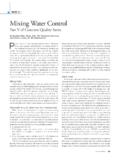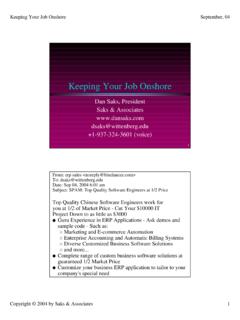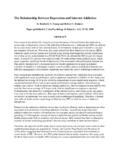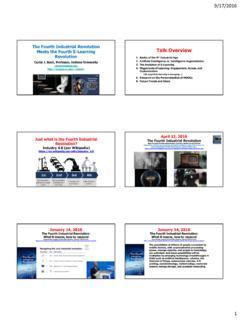Transcription of Are Entrepreneurs “Touched with Fire”?
1 1 Are Entrepreneurs Touched with Fire ? [1] Updated April 17, 2015 Pre-publication manuscript Contents Acknowledgement Abstract Evolutionary and macroeconomic context Theory development and literature review Methods Results: Are Entrepreneurs touched with fire ? Do asymptomatic Entrepreneurs come from asymptomatic families? Discussion Limitations Interpretation Policy implications References Thomas Edison Michael A. Freeman, University of California San Francisco Sheri L. Johnson, University of California Berkeley Paige J. Staudenmaier Stanford University Mackenzie R. Zisser University of California Berkeley For review and discussion only Correspondence about this manuscript can be sent to Michael Freeman at Copyright: 2015 Freeman et al.
2 This is an open-access article distributed under the terms of the Creative Commons Attribution Noncommercial License developed by Aaron Swartz and his colleagues which permits unrestricted noncommercial use, distribution, and reproduction in any medium, provided the original authors and sources are credited. 2 I have a lot of illnesses. I don't talk about it much, for a variety of reasons. I feel ashamed to have an illness. (It sounds absurd, but there still is an enormous stigma around being sick.) I don't want to use being ill as an excuse. (Although I sometimes wonder how much more productive I'd be if I wasn't so sick.) And, to a large extent, I just don't find it an interesting subject. (My friends are amazed by this; why is such a curious person so uncurious about the things so directly affecting his life?)
3 Ovik Banerjee Paul Castle Matt Berman Steven Good Steve Jobs Glen Mueller Kari Kairamo Heinz Prechter Autumn Radtke Eric Salvatierra Alan Schram Carsten Schloter L Wren Scott Jody Sherman Aaron Swartz Qinggen Wang Susie Steiner Ilya A diagnosis is not a disease. Thomas Szasz, We honor the memories of our brilliant, brave and beloved Entrepreneurs whose missions will never be accomplished. We seek to understand the causes of their strengths and vulnerabilities, hoping that application of this knowledge will empower future Entrepreneurs to prevail. Acknowledgements We gratefully acknowledge the support of the Entrepreneurs and comparison participants who made this study possible, and of our colleagues who recruited Entrepreneurs to participate in this research by communicating to incubators, accelerators, entrepreneur networks and meet-up groups, email and on-line newsletters, and public entrepreneurship events.
4 Karen Aidem James Colgan Kyra Davis Gloria Duffy Emily Francher Victoria Howell Katy Fike Saar Gur Lisa Gurwitch Paula Hawthorn Bj rn Herrmann Steve Hoffman Stephen Johnston Shahab Kaviani Matt Kursh Jonathan Malkin Stephanie Marrus Peter Mellen Anamaria Nino-Murcia Bryan Neuberg Cassandra Phillipps Cesar Plata Tom Ruginis Dick Sander Cynthia Scott Ikhlaq Sidhu Shervin Talieh Rebecca Turner Tom Wootton We thank the University of California Berkeley, the University of California San Francisco, and The Entrepreneurship Center at UCSF for direct and indirect support of this project, and Rebecca Freeman for her assistance with data visualization. 3 Abstract Importance: Entrepreneurs create the vast majority of new jobs, pull economies out of recessions, introduce useful products and services, and create prosperity.
5 Therefore it behooves us to understand the cognitive, affective, and behavioral strengths and vulnerabilities of Entrepreneurs . Prior research has identified the personality traits of successful Entrepreneurs , but little is known about the nature of their mental health characteristics or those of their families. Objective: To investigate the prevalence and characteristics of mental health conditions among Entrepreneurs and their first-degree family members. Method: Research procedures were approved by the UC Berkeley institutional review board. In this study, 242 Entrepreneurs and 93 demographically matched comparison participants took an anonymous on-line self-report survey to assess their engagement in entrepreneurship, and their individual and family mental health history. Differences between the two groups, and the first-degree relatives of asymptomatic members of both groups, were assessed for statistical significance using chi-square tests and t-tests.
6 Results: Self-reported mental health concerns were present across 72% of the Entrepreneurs in this sample, a proportion that was significantly higher than that of the comparison group. Entrepreneurs reported significantly more symptoms than the comparison participants, as 49% reported having one or more lifetime mental health conditions, 32% reported having two or more lifetime mental health conditions, 18% reported having three or more lifetime mental health conditions, and 23% reported being asymptomatic members of highly symptomatic families. The Entrepreneurs were significantly more likely to report a lifetime history of depression (30%), ADHD (29%), substance use conditions (12%) and bipolar diagnosis (11%) than were comparison participants. Groups did not differ in rates of anxiety, with 27% of Entrepreneurs and 26% of non- Entrepreneurs reporting anxiety concerns.
7 Asymptomatic Entrepreneurs described their first-degree relatives as experiencing significantly more mental health conditions than did the asymptomatic comparison participants, including depression, ADHD, substance use conditions, and anxiety. Limitations: Limitations of the data include reliance on self-report measures, possible selection bias, vulnerability to shared method variance and comparison group differences, and the reliance on a cross-sectional design. Conclusions and relevance: The findings of this study are important because they suggest an underlying relationship between entrepreneurship and many of the affective, cognitive, and behavioral differences associated with mental health conditions. Current findings add to a growing body of work suggesting that mental health symptoms, in individuals and their family members, may co-occur with highly advantageous and adaptive outcomes that benefit both the individual and society.
8 Understanding the strengths and vulnerabilities associated with personal and familial mental health histories may contribute to improved entrepreneurial outcomes, and to the development of protective resources for Entrepreneurs . These findings have programmatic and policy implications for business education, executive coaching, large employers and human resource managers, health policy, social policy, and macroeconomic 4 policy practitioners, and for mental health advocates. Policies and programs to properly insure and care for people with a wealth of notions (those with mental health conditions) may be synchronized with policies and programs that empower their admirable relatives (the Entrepreneurs ) to create the wealth of nations. Manuscript overview: This report begins by describing the role of neurobehavioral propensities and traits in the evolutionary and macroeconomic context of entrepreneurship.
9 Subsequently we discuss prior research related to the relationship between entrepreneurship and mental health differences, followed by describing the methods and findings of the current study. The paper concludes with a review of limitations of the data, and a discussion of their implications. Evolutionary and Macroeconomic Context Why entrepreneurship matters Entrepreneurship matters more than ever in today s interdependent, competitive, volatile global economy. Creative and innovative Entrepreneurs drive regional and national social and economic growth, create the vast majority of new jobs, and stand as the critical last firewall against recessions and catastrophic events produced by national and global economic volatility [2-4]. From 1980 through 2005 almost all American net job creation occurred in firms less than five years old.
10 During the depths of this American recession, Entrepreneurs and their young companies produced nearly 8 million of the 12 million jobs created in 2007 [5]. Contemporary economies cannot function without Entrepreneurs . The mindset and mental health of the Entrepreneurs we depend upon are thus an important social and economic resource. What gives Entrepreneurs this special power? Neurodiversity and neuroplasticity produced by eons of evolution has delivered a class of founders, co-founders, and self-employed individuals who have the cognitive, emotional, and behavioral propensities, traits, strengths, and vulnerabilities required to think different and act different in ways that matter for our economy. It behooves us to understand these differences. Entrepreneurship and its legacy in the human saga Venturing and innovation have accelerated the separation of humanity from every other animal species.







